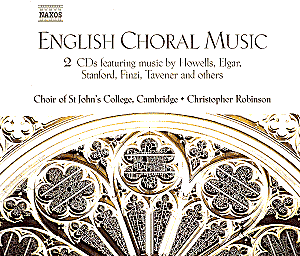Over a four-year span
Naxos made a splendid series of recordings
of English church music with the choir
of St. John’s College, Cambridge under
their distinguished Director of Music,
Christopher Robinson. The last of these
discs (I assume, unless there is something
still to be issued) was devoted to Elgar
and was set down immediately before
Robinson retired in the summer of 2003.
All the CDs were devoted to the music
of a single composer.
The single exception
is a miscellaneous collection entitled
An Evening Hymn, which showcased
the remarkable talent of treble, Oliver
Lepage-Dean. (I read somewhere that
his voice broke within days of the recording
sessions. If so, his voice was captured
just in the nick of time.) Three items
from that recital are included here.
Master Lepage-Dean sings the beautiful
solo in the Stanford Magnificat exceptionally
well. His voice is pure and focused
and his tuning and diction are consistently
spot-on in this item and elsewhere.
I was less convinced by his performance
of the Vaughan Williams song, not because
his singing of it is less than good
(it isn’t) but because this is an essentially
masculine song and I miss the extra
range, depth and weight of tone that
a baritone can bring. On the other hand
the litany setting by Peter Hurford
is an entirely apt choice. It’s a simple,
dignified piece and it is sung here
with eloquence and confidence.
For the most part the
music is grouped by composer and generally
speaking the chosen pieces complement
and contrast effectively. So, for example,
the reflective, rather conventional
setting of the Ave verum corpus
by Elgar is an excellent foil to the
much grander canvass that is Give
unto the Lord. Both pieces are given
first rate performances that conclusively
show that Christopher Robinson left
the choir in fine fettle when he retired.
No such compilation
would be complete without music by Herbert
Howells and some of his very finest
compositions are included here. The
St Paul’s canticles are probably the
best of the settings that he made, demonstrating
his exceptional sensitivity to words
and his unique harmonic palette. These
canticles are very well done by Robinson
and his choir, as is the masterly motet,
Take him, earth, for cherishing.
The two Finzi items
are just as successful. Welcome Sweet
and Sacred Feast is a wholly characteristic,
subtle offering while God is gone
up is much more extrovert, as befits
its subject matter. This latter piece
is, for me, one of the highlights of
the collection. Another is Walton’s
exquisite little anthem, Set me as
a seal upon thine heart. Here
we find yet another effective contrast
for the main offering by Walton is his
absolutely splendid Coronation Te
Deum, given here in a most effective
arrangement for organ accompaniment
which manages to convey the full panoply
of Walton’s inspiration.
John Tavener is represented
by a simple, directly devotional setting
of the Lord’s Prayer as well as by the
ubiquitous The Lamb and Song
for Athene. Far less familiar to
the general public is the music of Kenneth
Leighton. He is particularly well served
here by a setting of the evening canticles
dedicated to Bernard Rose. The Magnificat
is distinguished by some vigorous choral
writing and a demanding organ part.
It culminates in an ebullient ‘Gloria’.
By contrast, there’s a gentle ecstasy
at the opening of the Nunc Dimittis
but the setting expands to an affirmative
conclusion with a splendidly sonorous
organ part.
Lennox Berkeley also
receives proper attention in extracts
from a CD released to mark his centenary.
The deceptively straightforward (but,
in reality, very demanding) The Lord
is my Shepherd is a delight as is
the Richard Crawshaw setting, Look
up, Sweet Babe.
In truth, the standard
of the music on this pair of discs is
consistently high and so is the standard
of the performances. Christopher Robinson’s
tenure at St. John’s (1991-2003) was
the culmination of a long career as
one of this country’s most distinguished
choral conductors. His fastidious attention
to tonal blend and diction and his dedication
to the music he performed are self-evident
in everything the choir sings here.
It’s a pity that the various organ scholars
aren’t credited for all play splendidly.
Presumably, this compilation
marks the end of the Naxos – St. John’s
collaboration, at least in terms of
the involvement of Christopher Robinson.
This is a good time, then, to pay tribute
to Andrew Walton, the producer of all
the CDs (except the Lepage-Dean solo
album which was produced and engineered
by John Rutter.) Walton was ably supported
by Eleanor Thompson who engineered all
the recordings, except the Walton and
Tavener collections, which were the
work of Tony Faulkner. I’ve heard the
whole series and can attest to the excellence
of the productions. To my ears (though
I know not everyone holds this view)
the recorded sound throughout the series
has been very good indeed. The booklet
notes have been first class as well.
So far as I’ve been able to check the
notes accompanying this set are a usefully
condensed version of the original notes.
Full texts are supplied.
This collection is
an ideal introduction to the full series
of recordings from which they are taken.
It is also a fine tribute to the excellent
work of Christopher Robinson. We can
only hope that Naxos will soon be recording
this fine choir again under Robinson’s
distinguished successor, David Hill.
I recommend this excellent
and enjoyable collection with great
enthusiasm.
John Quinn


